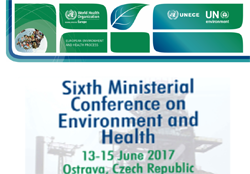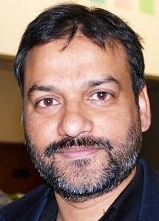…environmental degradation and pollution, climate change, exposure to harmful chemicals and the destabilization of ecosystems threaten the right to health, and disproportionately affect socially disadvantaged and vulnerable population groups , thereby exacerbating inequalities….
Sixth Ministerial Conference on Environment and Health, Ostrava, Czech Republic, 15 June 2017

by Daniele Dionisio
Membro, European Parliament Working Group on Innovation, Access to Medicines and Poverty-Related Diseases
Responsabile del Progetto Policies for Equitable Access to Health – PEAH http://www.peah.it/
Sesta Conferenza OMS Ambiente e Salute
equità e condivisione 
Il governo della Repubblica Ceca ha ospitato nella città di Ostrava dal 13 al 15 giugno 2017 la Sesta Conferenza Interministeriale su Ambiente e Salute della Regione Europea dell’OMS.
La Conferenza è stata organizzata dall’Ufficio Regionale OMS per l’Europa, in partenariato con l’ United Nations Economic Commission for Europe (UNECE) e l’ United Nations Environment Programme (UNEP).
Le priorità e le sfide per la salute
Le motivazioni della Conferenza discendono dall’evidenza che circa un milione e mezzo di decessi ogni anno nella Regione Europea sono causati da rischi ambientali che potrebbero essere evitati e/o eliminati. E’, pertanto, indilazionabile la necessità di intensificare il contrasto ai determinanti ambientali nocivi alla salute. Come è noto, essi includono l’inquinamento dell’aria, inadeguati servizi idrici e igienici, prodotti chimici pericolosi, rifiuti e siti contaminati, e scompensi climatici.
I vincoli di bilancio degli Stati Membri, le disuguaglianze socioeconomiche e di genere, la crescita delle patologie non trasmissibili, l’invecchiamento delle popolazioni, e un inaudito tasso di migrazione fra e dentro i Paesi della Regione hanno esacerbato cumulativamente le criticità accennate. I complessi rapporti fra fattori ambientali, biologici, demografici, economici e sociali richiamano perciò all’urgenza di rafforzare la capacità di resistenza delle comunità verso le pressioni fisiche, naturali e sociali del 21mo secolo.
Nel corso della Conferenza i rappresentanti dei 53 Paesi della Regione hanno articolato nuove risposte a queste molteplici sfide elaborando sull’evidenza che la salvaguardia dell’ambiente è essenziale alla sopravvivenza dell’umanità. In questo spirito, accenti forti sono stati assunti sulla valenza transfrontaliera delle sfide ambientali, sulla necessità di azioni mirate non solo a livello nazionale, ma pure in ambito subnazionale e urbano, sull’importanza di identificare e tutelare le fasce più vulnerabili, e sulla imprescindibilità di una ‘governance’ aperta alla partecipazione dei cittadini e degli operatori di settore.
Lavorare in partenariato verso obiettivi globali
La Conferenza ha abbracciato la missione di promuovere sinergie chiave per gli obiettivi di salute, benessere e ambiente inclusi nel Programma ‘Health 2020’ per l’Europa e nell’Agenda 2030 delle Nazioni Unite (UN) per lo Sviluppo Sostenibile.
Focalizzando, infatti, sulla creazione di ambienti favorevoli e di comunità resistenti (fra i temi cardine di ‘Health 2020’), la Conferenza ha inteso assegnare alla strategia europea per la salute e l’ambiente il ruolo di piattaforma di implementazione, nella Regione Europea dell’ OMS, per gli inerenti goals e targets compresi nell’Agenda UN 2030 per lo Sviluppo Sostenibile.
Dichiarazione ministeriale per un’Europa protesa al futuro
Al termine della Conferenza gli Stati Membri hanno condiviso e siglato una dichiarazione comprensiva di un piano d’azione per la sua implementazione e dell’impegno di misurare e riferire sui progressi specifici attraverso i ‘reporting’ nazionali previsti per la verifica dei Goals di Sviluppo Sostenibile (SDGs) dell’Agenda UN 2030.
In armonia con lo spirito ed i contenuti della Conferenza, la Dichiarazione insiste sulla necessità che equità, inclusione sociale e uguaglianza di genere informino le politiche per l’ambiente e la salute, sull’urgenza della transizione da energie fossili a rinnovabili, e sull’assoluta esigenza di tecnologie pulite e sicure, incluse soluzioni di ‘bassa emissione’ nei trasporti, nel contesto di un ridisegno coerente degli spazi e agglomerati urbani.
Particolare enfasi è posta dalla Dichiarazione su azioni chiave quali ‘sine qua non’ per il conseguimento degli obiettivi:
– miglioramento della qualità dell’aria in linea con le linee guida OMS
-accesso universale, equo e sostenibile ad acqua potabile e igiene personale e ambientale per tutti e in tutti gli ambiti
-lotta agli effetti tossici dei prodotti chimici mediante sostituzione con alternative accettabili, con stretta attenzione alle fasce più giovani e indifese
-sviluppo di programmi nazionali per l’eliminazione delle malattie legate all’asbesto
-espansione di ambienti ‘tobacco smoke-free’, con particolare riguardo alla minore età
-prevenzione ed eliminazione degli effetti nefasti dello smaltimento dei rifiuti, e delle connesse diseguaglianze
-applicazione in concreto dei principi e delle risoluzioni dell’Accordo sul Clima di Parigi 2015
-implementazione di coerenti ed efficaci politiche attraverso multipli livelli di ‘governance’, trasparenti assunzioni di responsabilità e migliori pratiche da parte delle leadership
-perfezionata sostenibilità ambientale dei sistemi sanitari, inclusa la gestione dei rifiuti in termini di ridotta contaminazione esterna, oltre all’uso oculato e responsabile delle necessarie risorse e fonti energetiche.
Appropriatamente, il documento sostiene che le risoluzioni e azioni ‘ad hoc’ non possono esimersi dall’ adozione di mentalità e prassi cooperative e multi-partecipative tese a migliorare, su base intersettoriale, la coerenza, la trasparenza, la coordinazione e la volontà collaborativa dei decisori a tutti i livelli al fine di scongiurare il rischio di duplicazione e frammentazione delle iniziative.
PER APPROFONDIRE
WHO Regional Office for Europe http://www.euro.who.int/en/home
United Nations Economic Commission for Europe (UNECE) https://www.unece.org/info/ece-homepage.html
United Nations Environment Programme (UNEP) http://www.unep.org/about/
Health 2020 http://www.euro.who.int/en/health-topics/health-policy/health-2020-the-european-policy-for-health-and-well-being
United Nations 2030 Agenda https://sustainabledevelopment.un.org/post2015/transformingourworld/publication
Sixth Ministerial Conference on Environment and Health http://www.euro.who.int/en/media-centre/events/events/2017/06/sixth-ministerial-conference-on-environment-and-health/read-more
Declaration of the Sixth Ministerial Conference on Environment and Health http://www.euro.who.int/__data/assets/pdf_file/0007/341944/OstravaDeclaration_SIGNED.pdf












